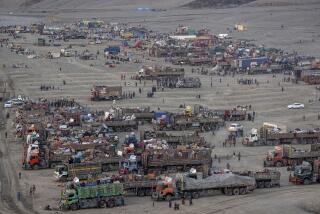Mongolia Faces ‘Big Freeze’ Amid Total Ruins of Failed Socialist State : Transition: A frigid winter adds to woes of the populace with the nation’s economy facing collapse amid sketchy plans to deal with nature’s violence.
- Share via
ULAN BATOR, Mongolia — This year Mongolia may finally come face to face with the “Big Freeze,” a winter that forces urban residents back into the tents of their ancestors and turns modern cities into empty, frigid hulks.
Nature is at her harshest in this isolated part of Asia, with winter temperatures plunging to minus 31 degrees Fahrenheit and sharp sheets of wind screaming off the Siberian steppe.
Cold is nothing new for Mongolia, but this year may be different.
Mongolia’s economy, jolted to pieces by a wrenching transition from socialist central planning, is close to total collapse.
Regular power cuts have crippled the coal industry and there is not enough gasoline to transport supplies. The state has less than one week of diesel fuel in stock.
Mongolian officials now face the very real possibility that urban centers may literally freeze solid this winter, and are making sketchy evacuation plans to move people back to traditional tent villages in the countryside, where at least campfires and ready supplies of meat will offer a chance at survival.
“This time we think it’s the real thing,” said one foreign aid official in Ulan Bator.
Warnings of a freeze-out have grown louder since 1990, when Mongolia’s Communist leaders followed their former masters in Moscow by abandoning their monopoly on power, allowing free elections and calling for free markets.
The nation began its descent into financial crisis almost immediately, when the economically strapped Soviet Union, long Mongolia’s main source of oil, cut off supplies in late 1990.
Despite shortages of everything from potatoes to matches, Mongolia managed to scrape through last winter, in part thanks to relatively mild temperatures.
This year, the vast country locked between Russia and China may not be so lucky. Temperatures are low, and the three hardest months are yet to come.
Already, current coal stocks are 10% lower than they were at this time a year ago. Last February Mongolia’s largest power plant came to within half a day of running out of coal.
Hacking coal out of mines set in the frozen tundra is only part of the problem. Mongolia’s lack of hard currency means that spare parts for mining equipment are in short supply and also prevents desperately needed imports of diesel and other fuels.
Mongolia already owes Russian fuel suppliers more than $10 million, and the country has no hard currency to pay for any more. Fuel consumption this year is estimated at only 40% of 1989 levels.
The state fuel importing company, PISC, estimates that diesel stock might not last to the end of the month. While stocks of other fuels are in somewhat better shape, officials say domestic airline flights may be grounded in coming weeks because of a lack of aviation fuel.
“The shortages already badly hurt the countryside, with hospitals and schools severely affected,” said PISC chief J. Oyungerel.
Diplomats have been told that about two-thirds of schools face imminent closure because of lack of heating.
Officials so far are desperately trying to keep fuel flowing to the cities, where about half of Mongolia’s 2 million people live in Soviet-style apartment buildings.
The educated elite city-dwellers have left behind them the nomadic grassland traditions that allowed their forebears to make it through bitter winters to the spring.
They may now be in for a crash course.
In Ulan Bator, officials are drawing up emergency plans to move residents of apartments without independent sources of heating--meaning up to a quarter of the capital’s 600,000 people--into outlying villages where herdsmen still live in traditional felt tents.
The plan, to be acted upon only in case of a complete breakdown in the city’s power and heating systems, has so far not been made public.
“It should not be broadcast through the mass media to the whole population because it would create a panic mentality,” said Col. P. Damdin, Mongolia’s civil defense chief.
Mongolia is hoping to fend off this type of emergency with the help of foreign aid, and is taking planeloads of relief supplies such as metal cables, boiler tubing and other spare parts to keep coal mines and power plants running.
Meanwhile, as heating temperatures in city apartments drop to just above freezing, Mongolians themselves are wearing winter coats inside and using their front porches as a natural deep freeze for sides of beef and other supplies.
PISC’s Oyungerel said the seeming lack of concern in Parliament, which spent the last few weeks arguing a new tax law instead of debating the winter emergency, did not mean that Mongolia was out of crisis.
“It’s the peculiarity of Mongolians to fight the fire after the fire has burnt out,” she said, quoting a common proverb.
More to Read
Sign up for Essential California
The most important California stories and recommendations in your inbox every morning.
You may occasionally receive promotional content from the Los Angeles Times.












